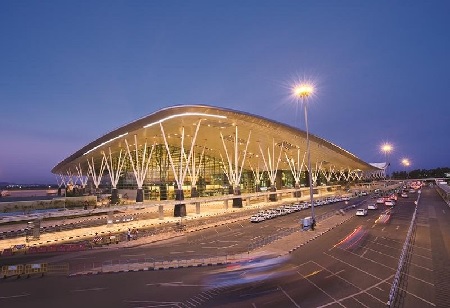
US Proposes One-Stop Security Screening with India at Aviation Summit

 In a significant move to streamline air travel between the United States and India, David Pekoske, Administrator of the US Transportation Security Administration (TSA), advocated for a one-stop security screening arrangement at the India-US Civil Aviation Summit. This proposal aims to eliminate redundant security procedures for passengers traveling between the two nations, thereby enhancing efficiency and security.
In a significant move to streamline air travel between the United States and India, David Pekoske, Administrator of the US Transportation Security Administration (TSA), advocated for a one-stop security screening arrangement at the India-US Civil Aviation Summit. This proposal aims to eliminate redundant security procedures for passengers traveling between the two nations, thereby enhancing efficiency and security.
"With a one-stop agreement with the Indian government and Delhi airport, passengers and their checked baggage would seamlessly transfer from aircraft to aircraft without the need for re-screening", Pekoske highlighted at the summit. "This concept could significantly elevate global aviation security standards, ensuring that US screening processes also meet Indian requirements".
This arrangement would allow US-bound passengers departing from Indian airports like Delhi to undergo security screening at their point of embarkation. Upon arrival in the US, their checked baggage would automatically transfer to any connecting domestic flights without additional screening. The system would operate reciprocally for India-bound passengers.
The International Civil Aviation Organisation (ICAO), a UN body that promotes civil aviation cooperation among member countries, supports the One-Stop Security (OSS) concept. ICAO states, “OSS agreements eliminate unnecessary duplication of security controls, increase the global sustainability of aviation security systems, and facilitate a smoother transfer process for passengers and their belongings, leading to shorter connection times, fewer missed connections, and fewer lost bags”.
Pekoske also proposed enhancing cooperation in areas such as data sharing and cybersecurity to further harmonize aviation security between the US and India. He suggested the establishment of a TSA representative, known as TSAR, in New Delhi, underscoring the importance of local interaction in strengthening bilateral partnerships.
The summit, hosted by the US Trade Development Agency (USTDA) in collaboration with the Indian Ministry of Civil Aviation, marks the seventh iteration and the first in seven years, following disruptions caused by the Covid-19 pandemic.
Leading the Indian delegation, Civil Aviation Secretary Vumlunmang Vualnam emphasized India's robust recovery post-Covid, noting that both domestic and international air passenger numbers have returned to pre-pandemic levels. “Our airlines have been resilient, and new airlines have emerged, with more in the pipeline", Vualnam remarked, adding that the number of airports in India has increased from 74 to 157 over the past decade.
Vualnam attributed this growth to a solid regulatory framework, the availability of land, transparent airport tariff determinations by an autonomous body, and efforts to develop a skilled workforce, including commercial pilots. He also highlighted ongoing initiatives to streamline the maintenance, repair, and overhaul (MRO) industry in India.
The summit's inaugural session featured remarks from Enoh T. Ebong, Director of the USTDA, Michael Whittaker, Administrator of the Federal Aviation Administration (FAA), and Sripriya Ranganathan, Deputy Chief of Mission at the Indian Embassy, each reinforcing the importance of bilateral cooperation in advancing civil aviation standards.
The proposed one-stop security screening initiative represents a pivotal step towards more efficient and secure air travel between the US and India, reflecting the ongoing commitment to strengthening aviation ties between the two countries.

